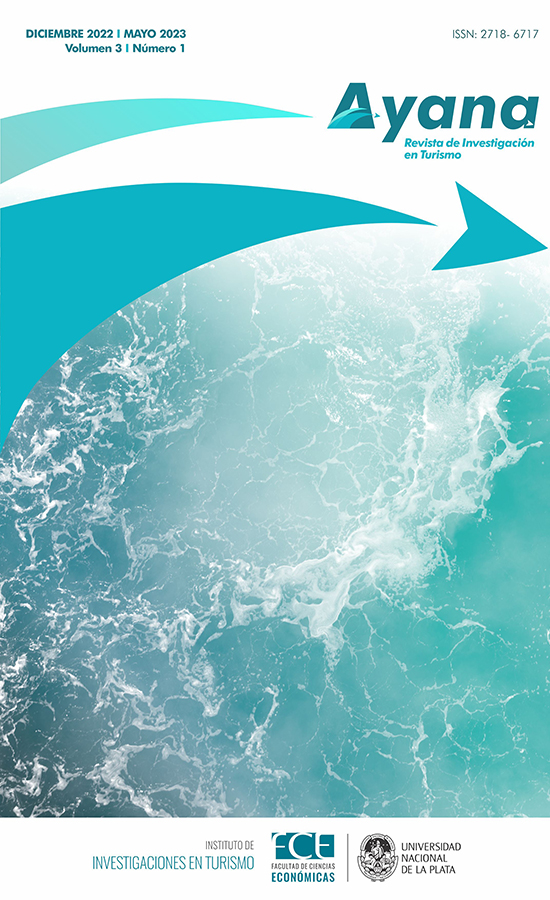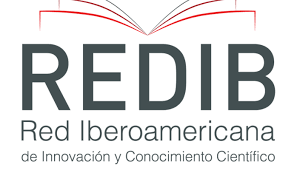Indicators to Assess Adaptation to Climate Change through Ecotourism
DOI:
https://doi.org/10.24215/27186717e030Keywords:
A.D.A.P.T., climate change adaptation, ecotourism, indicators, Delphi methodAbstract
While adaptation to climate change focuses on the green energy technological revolution called grey adaptation, the little-mentioned green and hybrid adaptations, corresponding to practices such as ecotourism, have yet to be explored. Therefore, this work seeks to highlight adaptation through ecotourism. In the absence of an exclusive manual on adaptation to climate change and tourism, the methodology of multi-criteria analysis proposed by the German Society for International Cooperation was adapted, whose criteria are selected through indicators using A.D.A.P.T. and Delphi, in which 30 international experts evaluate 983 indicators. The results represent a significant contribution to climate change adaptation and tourism by obtaining 25 precise indicators, as well as the discussion about the difficulty and disorder of the indicators proposed by international manuals that could cause poor adaptation, the difficulty in making decisions and the selection of wrong measures. Finally, we stress the need to recover true ecotourism and implement it as an adaptation measure.
Downloads
References
Adger, W. N., Agrawal, S., Mirza, M. M. W., Conde, C., O’brien, K. L., Pulhin, J., Pulwarty, R., Smit, B. y Takahashi, K. (2007). Assessment of adaptation practices, options, constraints and capacity. En Climate change 2007: impacts, adaptation and vulnerability. Contribution of working group II to the fourth assessment report of the Intergovernmental Panel on Climate Change (pp. 719–743). Cambridge University Press.
Agyeman, Y. B. (2014). The role of local knowledge in sustaining ecotourism livelihood as an adaptation to climate change. UWSpace.
Agyeman, Y. B. (2019). Ecotourism as an Adaptation Strategy for Mitigating Climate Change Impacts on Local Communities Around Protected Areas in Ghana. In Handbook of Climate Change Resilience (pp. 1–19). Springer. https://doi.org/10.1007/978-3-319-71025-9_159-1
Astigarraga, E. (2004). El Método Delphi. Universidad de Deusto.
Aziz, A., Barzekar, G., Ajuhari, Z. y Idris, N. H. (2015). Criteria & indicators for monitoring ecotourism sustainability in a protected watershed: a Delphi consensus. IOSR Journal of Environmental Science, Toxicology and Food Technology, 10(9), 105–111. https://doi.org/10.9790/2402-09310109
Bours, D., McGinn, C. y Pringle, P. (2014). Guidance note 2: Selecting indicators for climate change adaptation programming. UKCIP.
Butler, M., Gering, E. y Wilsey, D. (2017). Guiding Local Tourism Entrepreneurs Interested in Ecotourism: A Tool for Extension Facilitators. Journal of Extension, 55(5). https://tigerprints.clemson.edu/joe/vol55/iss5/2/
Carter, J. G., Cavan, G., Connelly, A., Guy, S., Handley, J. y Kazmierczak, A. (2015). Climate change and the city: Building capacity for urban adaptation. Progress in Planning, 95, 1–66. https://doi.org/10.1016/j.progress.2013.08.001
Dirección de planificación (2017, mayo). Introducción a la Prospectiva. Síntesis metodológica. Oficina de planeamiento y presupuesto. Presidencia de Uruguay.
Djalante, R. (2019). Key assessments from the IPCC special report on global warming of 1.5 °C and the implications for the Sendai framework for disaster risk reduction. Progress in Disaster Science, 1. https://doi.org/10.1016/j.pdisas.2019.100001
Edenhofer, O. (2015). Climate change 2014: mitigation of climate change (Vol. 3). Cambridge University Press.
Fennell, D. A. y Cooper, C. (2020). Sustainable tourism. Channel View Publications.
Füssel, H. M. y Klein, R. (2021, 21 de junio). Conceptual Frameworks of Adaptation to Climate Change and Their Applicability to Human Health (Report). Potsdam Institute for Climate Impact Research (PIK). https://www.osti.gov/etdeweb/biblio/20559968.
García, M. y Suárez, M. (2013). El método Delphi para la consulta a expertos en la investigación científica. Revista Cubana de Salud Pública, 39(2), 253–267.
Guía para Monitoreo y Evaluación de Intervenciones de Adaptación Basada en Ecosistemas. (2020). Deutsche Gesellschaft für Internationale Zusammenarbeit (GIZ).
Gómez, M. B., Armesto López, X. A. y Cors Iglesias, M. (2017). Percepción del cambio climático y respuestas locales de adaptación: el caso del turismo rural. Cuadernos de Turismo, 39, 287. https://doi.org/10.6018/turismo.39.290571
Hammill, A., Dekens, J., Leiter, T., Klockemann, L., Stock, E., Gläser, A., Dekens, J., Olivier, J. y Stock, E. (2014). Repository of Adaptation Indicators: real case examples from national Monitoring and Evaluation Systems. Deutsche Gesellschaft für Internationale Zusammenarbeit (GIZ). https://policycommons.net/artifacts/614782/repository-of-adaptation-indicators/1595170/
Holladay, P. J. (2018). Destination Resilience and Sustainable Tourism Development. Tourism Review International, 22(3), 251–261. https://doi.org/10.3727/154427218X15369305779029
Homberg, A., Klafke, N., Glassen, K., Loukanova, S. y Mahler, C. (2020). Role competencies in interprofessional undergraduate education in complementary and integrative medicine: A Delphi study. Complementary Therapies in Medicine, 54, 102542. https://doi.org/10.1016/j.ctim.2020.102542
INECC. (2021, 21 de junio). Enfoques a considerar en el proceso de adaptación. https://cambioclimatico.gob.mx/enfoques-a-considerar-en-el-proceso-de-adaptacion/
IPCC. (2021, 21 de junio). Climate Change 2022: Impacts, Adaptation and Vulnerability. https://www.ipcc.ch/report/sixth-assessment-report-working-group-ii/
Jamaliah, M. M. y Powell, R. B. (2018). Ecotourism resilience to climate change in Dana Biosphere Reserve, Jordan. Journal of Sustainable Tourism, 26(4), 519–536. https://doi.org/10.1080/09669582.2017.1360893
Kabisch, N., Stadler, J., Korn, H. y Bonn, A. (2017). Nature-Based solutions for societal goals under climate change in urban areas–Synthesis and Ways Forward. En Nature-Based Solutions to Climate Change Adaptation in Urban Areas (pp. 323–336). Springer, Cham.
Karst, H. (2017). Protected areas and ecotourism: charting a path toward social-ecological wellbeing [Tesis de posgrado]. University of Waterloo. https://uwspace.uwaterloo.ca/bitstream/handle/10012/11194/Karst_Heidi.pdf?sequence=1&isAllowed=y
Knowlton, N. (2021). Ocean Optimism: Moving Beyond the Obituaries in Marine Conservation. Annual Review of Marine Science, 13(1), 479–499. https://doi.org/10.1146/annurev-marine-040220-101608
Locatelli, B., Fedele, G., Fayolle, V. y Baglee, A. (2016). Synergies between adaptation and mitigation in climate change finance. International Journal of Climate Change Strategies and Management, 8(1), 112–128. https://doi.org/10.1108/IJCCSM-07-2014-0088
Mao, X., Loke, A. Y. y Hu, X. (2020). Developing a tool for measuring the disaster resilience of healthcare rescuers: a modified Delphi study. Scandinavian Journal of Trauma, Resuscitation and Emergency Medicine, 28(1), 4. https://doi.org/10.1186/s13049-020-0700-9
Markou, M., Michailidis, A., Loizou, E., Nastis, S. A., Lazaridou, D., Kountios, G., Allahyari, M. S., Stylianou, A., Papadavid, G. y Mattas, K. (2020). Applying a Delphi-Type Approach to Estimate the Adaptation Cost on Agriculture to Climate Change in Cyprus. Atmosphere, 11(5), 536. https://doi.org/10.3390/atmos11050536
McMillan, S. S., King, M. y Tully, M. P. (2016). How to use the nominal group and Delphi techniques. International Journal of Clinical Pharmacy, 38(3), 655–662. https://doi.org/10.1007/s11096-016-0257-x
Muñoz, L. M. L. R. (2006). El ecoturismo, alternativa de desarrollo para áreas protegidas privadas, caso del Parque Natural Isla Huapi, Valdivia. [Tesis de grado]. Universidad Austral de Chile.
Nahuelhual, L., Carmona, A., Aguayo, M. y Echeverria, C. (2014). Land use change and ecosystem services provision: a case study of recreation and ecotourism opportunities in southern Chile. Landscape Ecology, 29(2), 329–344. https://doi.org/10.1007/s10980-013-9958-x
Njoroge, J. M. (2015). Climate change and tourism adaptation: literature review. Tourism and hospitality management, 21(1), 95–108. https://doi.org/10.20867/thm.21.1.7
Ocampo, L., Ebisa, J. A., Ombe, J. y Escoto, M. (2018). Sustainable ecotourism indicators with fuzzy Delphi method – A Philippine perspective. Ecological Indicators, 93, 874–888. https://doi.org/10.1016/j.ecolind.2018.05.060
Palter, V. N., MacRae, H. M. y Grantcharov, T. P. (2011). Development of an objective evaluation tool to assess technical skill in laparoscopic colorectal surgery: a Delphi methodology. The American Journal of Surgery, 201(2), 251–259. https://doi.org/10.1016/j.amjsurg.2010.01.031
Pasape, L., Anderson, W. y Lindi, G. (2015). Assessment of indicators of sustainable ecotourism in Tanzania. Anatolia, 26(1), 73–84. https://doi.org/10.1080/13032917.2014.912244
Prasetyo, N., Carr, A. y Filep, S. (2020). Indigenous Knowledge in Marine Ecotourism Development: The Case of Sasi Laut, Misool, Indonesia. Tourism Planning & Development, 17(1), 46–61. https://doi.org/10.1080/21568316.2019.1604424
Pringle, P. y Leiter, T. (2018). Pitfalls and potential of measuring climate change adaptation through adaptation metrics. En Adaptation metrics: Perspectives on measuring, aggregating and comparing adaptation results. UNEP-DTU.
Rábago, N. L. y Revah, L. (2000). El ecoturismo: ¿una nueva modalidad del turismo de masas? Economía Sociedad y Territorio. https://doi.org/10.22136/est002000436
Reguant, M. y Torrado, M. (2016). El método Delphi. REIRE. Revista d’Innovación i Recerca en Educación, 9 (1). https://doi.org/10.1344/reire2016.9.1916
Rodríguez, R. G. (2010). Ecoturismo Mexicano: la promesa, la realidad y el futuro. Un análisis situacional mediante estudios de caso. El Periplo Sustentable (18), 37-67. https://www.redalyc.org/pdf/1934/193414423002.pdf
Rozzi, R. (2019). Áreas protegidas y ética biocultural. En Naturaleza en Sociedad. Una mirada a la dimensión humana de la Conservación de la Biodiversidad. Ocholibros.
Sánchez, R. M., Solana Vásquez, O. R. y Gómez-Velázquez, J. (2013). La Sustentabilidad de las Comunidades Mexicanas en el Ecoturismo (The Sustainability of Mexican Communities in Eco-Tourism). Revista Global de Negocios, 1(1), 73-81. https://papers.ssrn.com/sol3/papers.cfm?abstract_id=2324437
Santamarta, J. (2000). Turismo y medio ambiente. World Watch.
Silva Villanueva, P. (2011). Learning to ADAPT: monitoring and evaluation approaches in climate change adaptation and disaster risk reduction–challenges, gaps and ways forward. Strengthening Climate Resilience Discussion Paper (9), https://opendocs.ids.ac.uk/opendocs/handle/20.500.12413/2509
Scott, D., Amelung, B., Ceron, J.-P., Dubois, G., Gössling, S., Peeters, P. y Simpson, M. C. (2008). Climate change and tourism: Responding to global challenges. World Tourism Organization.
Scott, D. y Becken, S. (2010). Adapting to climate change and climate policy: progress, problems and potentials. Journal of Sustainable Tourism, 18(3), 283–295. https://doi.org/10.1080/09669581003668540
Scott, D., Hall, C. M. y Stefan, G. (2012). Tourism and Climate Change. Routledge. https://doi.org/10.4324/9780203127490
Secretaría de medio ambiente y recursos naturales. (2015). Metodología de priorización de adaptación al cambio climático. Guía de uso y difusión. Deutsche Gesellschaft für Internationale Zusammenarbeit (GIZ) GmbH.
Teeroovengadum, V. (2019). Environmental identity and ecotourism behaviors: examination of the direct and indirect effects. Tourism Review, 74(2), 280–292. https://doi.org/10.1108/TR-11-2017-0190
Tomasik, T. (2010). Reliability and validity of the Delphi method in guideline development for family physicians. Quality in primary care, 18(5), 317-326. https://europepmc.org/article/med/21114912
UKCIP. (2019, 3 de noviembre). Supporting effective climate change adaptation. https://www.ukcip.org.uk/
Leiter, T., Olhoff, A., Al Azar, R., Barmby, V., Bours, D., Clement, V.W.C., Dale, T.W., Davies, C. y Jacobs, H. (2019). Adaptation metrics: current landscape and evolving practices. UNEP-DTU.
United Nations Climate Change. (2015). The Paris Agreement. https://unfccc.int/process-and-meetings/the-paris-agreement/the-paris-agreement
United Nations Climate Change. (2020). No National Adaptation Programmes of Action. https://unfccc.int/topics/resilience/workstreams/national-adaptation-programmes-of-action/introduction
Wabnitz, C. C. C., Cisneros-Montemayor, A. M., Hanich, Q. y Ota, Y. (2018). Ecotourism, climate change and reef fish consumption in Palau: Benefits, trade-offs and adaptation strategies. Marine Policy, 88, 323–332. https://doi.org/10.1016/j.marpol.2017.07.022
Wingood, G. M. y DiClemente, R. J. (2008). The ADAPT-ITT Model. JAIDS Journal of Acquired Immune Deficiency Syndromes, 47(1), S40–S46. https://doi.org/10.1097/QAI.0b013e3181605df1
Ziegler, J., Araujo, G., Labaja, J., Snow, S., King, J. N., Ponzo, A., Rollins, R. y Dearden, P. (2021). Can ecotourism change community attitudes towards conservation? Oryx, 55(4), 546–555. https://doi.org/10.1017/S0030605319000607
Downloads
Published
How to Cite
Issue
Section
License
Copyright (c) 2022 Ana Mónica de Jhesú García García, Valente Vázquez Solís, Álvaro Gerardo Palacio Aponte

This work is licensed under a Creative Commons Attribution-ShareAlike 4.0 International License.
Those authors who have publications with this journal, agree with the following terms:
a. Authors will retain its copyright and will ensure the rights of first publication of its work to the journal, which will be at the same time subject to the Creative Commons Atribución-NoComercial-SinDerivadas 4.0 Internacional (CC BY-NC-ND 4.0) allowing third parties to share the work as long as the author and the first publication on this journal is indicated.
b. Authors may elect other non-exclusive license agreements of the distribution of the published work (for example: locate it on an institutional telematics file or publish it on an monographic volume) as long as the first publication on this journal is indicated,
c. Authors are allowed and suggested to disseminate its work through the internet (for example: in institutional telematics files or in their website) before and during the submission process, which could produce interesting exchanges and increase the references of the published work. (see The effect of open Access)

























